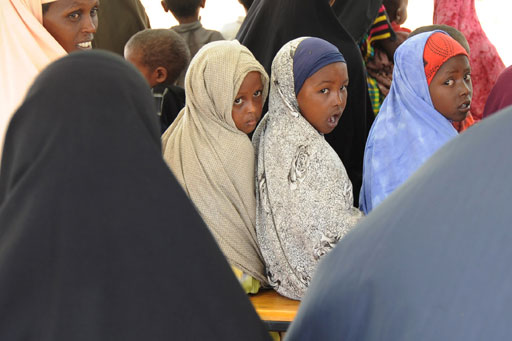
Wednesday, October 24, 2012
By Bosire Boniface

Somali refugees wait to be registered by the United Nations High Commissioner for Refugees at the Dagahaley camp in Kenya's Dadaab refugee complex. [Simon Maina/AFP]
In March 2010, Hussein Abdi Malik came to Garissa seeking economic independence away from the squalid living conditions in Kenya's Dadaab refugee complex.
The 42-year-old refugee from Somalia set up a textile shop at the Mugdi market in town. By his own account, his business has enabled him to support his family of five who joined him in Garissa last January.
However, after government authorities issued a two week ultimatum ordering all refugees and unregistered migrants to move to designated refugee camps by October 20th, Malik said his livelihood has been threatened.
"The order caught us unaware," Malik told Sabahi. "We are being accused of harbouring al-Shabaab militants and hiding illegal weapons. But not all of us are bad and we should not be forced to suffer because of few individuals."
"I came here to seek independence from the paltry relief food we receive in the camps," he said. "If the government is serious I do not know what the future holds."
Refugees ready to collaborate with security officials
Located near the Somali border in Kenya's North Eastern Province, the Dadaab complex hosts four refugee camps: Ifo, Ifo II, Dagahaley and Hagadera.
Originally designed to house 90,000 refugees in the early 1990s after Somali's central government collapsed, the camps now shelter more than 500,000 people, according to the United Nations High Commissioner for Refugees (UNHCR).
Because of overcrowding, many refugees chose to sneak out of the camps to seek economic independence and a sense of community in nearby urban areas, according to a report compiled by Humanitarian Policy Group, the International Rescue Committee and the Refugee Consortium of Kenya.
The report, titled "Hidden and Exposed: Urban Refugees in Nairobi, Kenya", said unlike the enclosed camps, urban centres present obvious opportunities to stay anonymous and engage in economic activities.
The exact number of refugees living in Garissa is not known, according to UNHCR spokesman for Kenya Emmanuel Nyabera. He said the UNHCR has yet to receive comprehensive communication from government officials on the relocation orders.
Refugees who spoke with Sabahi say they are ready to work with authorities because they see al-Shabaab as a threat to all and have been affected by their attacks first-hand.
Zahara Abdi Yussu, 43, who runs a cosmetics shop in Garissa, said the al-Qaeda-allied militants are part of the reason why refugees are in Kenya in the first place.
"We fled from Somalia because of their criminal acts and they are following us to cause havoc in our host country," she told Sabahi. "We have met on our own as refugee community and agreed that we should work with the security officers to eliminate the menace."
But shop owner Malik said he hopes that law-abiding refugees will be able to work with the authorities without having to return to the camps and government hand-outs.
Door-to-door operations to flush out refugees
Garissa County Commissioner Mohammed Maalim told Sabahi that urban refugees, especially those from Somalia, have underscored the challenges the government faces in maintaining security in the country.
"The government is convinced beyond any doubt [that some of the Somalis] are involved in a spate of heinous attacks and smuggling of explosives and weapons that have been used in all attacks against our security officers, civilians and aid workers," Maalim said earlier this month.
Maalim said that after long deliberations by security officials in Garissa, the government decided all refugees should be restricted to designated camps. The call for refugees to return to the camps is simply a reinforcement of existing laws pertaining refugees, he said.
When the two-week period ended on October 20th, police began conducting door-to-door operations to flush out refugees who have not returned, he said.
North Eastern Provincial Commissioner Ernest Munyi told Sabahi the relocation order was one of 21 resolutions reached during a Garissa leaders' security meeting October 4th.
Other resolutions included banning motorcycle and taxi operators working after 8 pm because it was discovered that some operators were being used to transport al-Shabaab militants to execute attacks, he said.
Badu Katelo, Kenya's acting commissioner for refugee affairs, told Sabahi the relocation order is the result of some refugees' unwillingness to adhere to previous orders.
"Since 2007, we have been pleading with refugees in urban centres to come forward to register with the government. We wanted to account for what they do and where they live, but few came out," he said.
With the new enforcement and security measures, refugees will only be allowed outside of the camps under strict circumstances, Katelo said.
Yet Executive Director of Northern Forum for Democracy Khalif Abdi Farah said the government should carry out the orders with caution and not mistakenly lump Somali-Kenyans with Somali refugees.
"The exercise is likely to raise claims of harassment because it is difficult to differentiate a Kenyan from a refugee," he told Sabahi, adding that some citizens do not have national identity cards.